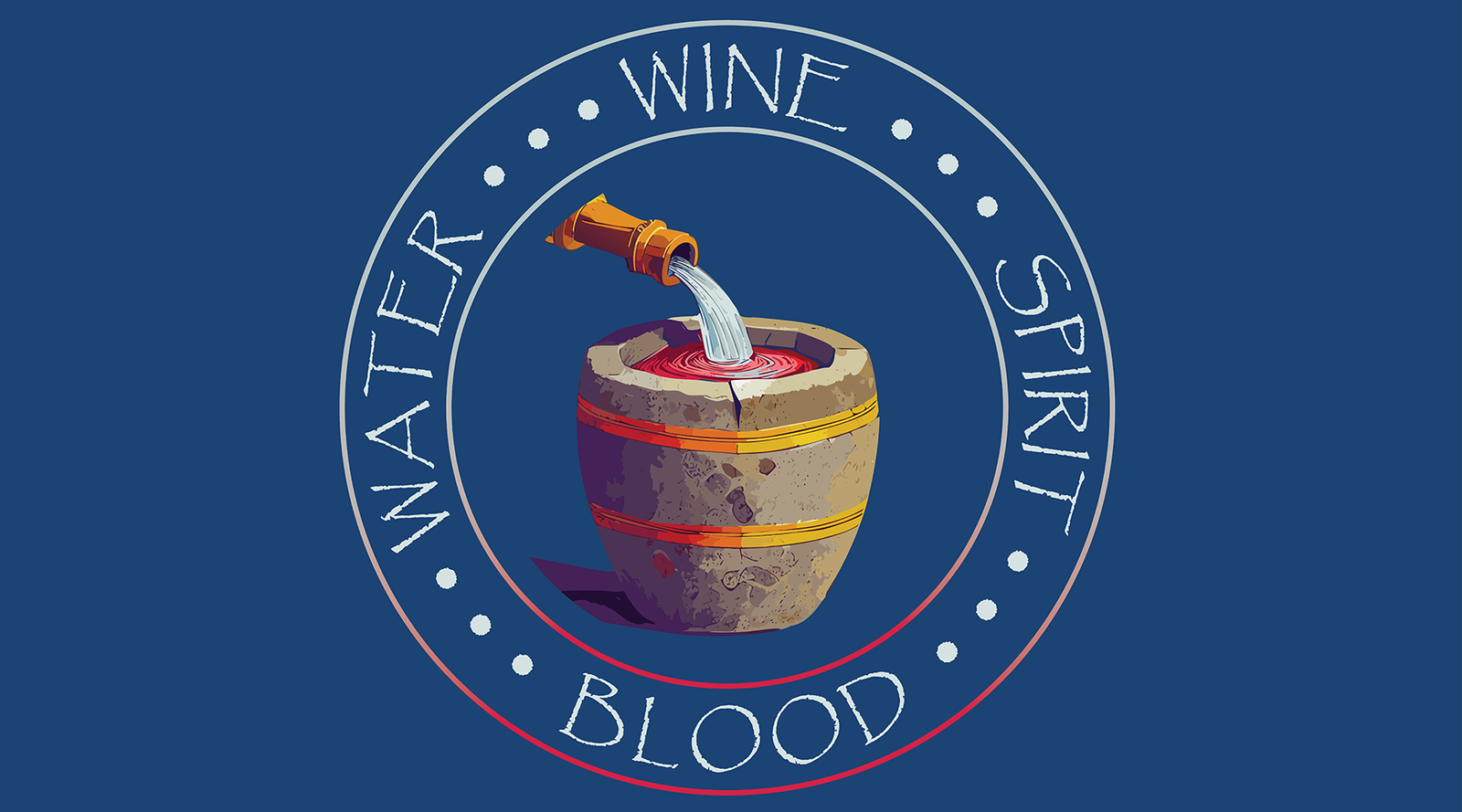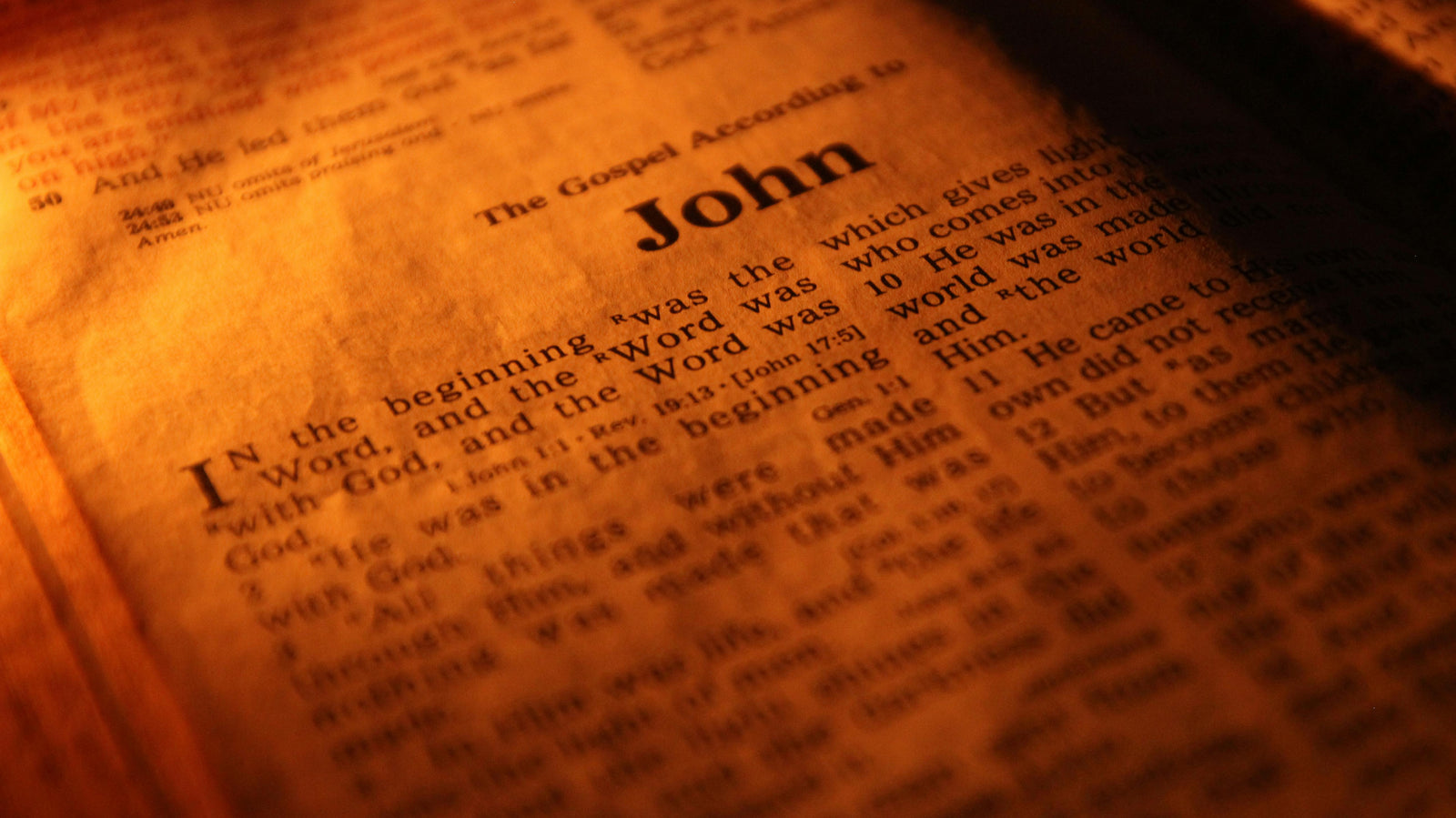The Amazing Meaning of the Prophecy, “Zeal for Your House Will Consume Me”
When Jesus cleared the temple, the disciples caught a glimpse into the marvelous meaning of the prophecy, “Zeal for Your house will consume me.” Through this living parable, Jesus revealed that He is His Father’s house. When we abide in Him, our guilt becomes His guilt. He then works with passion to rid Himself of that sin while retaining us as members of Himself.
Some years ago, I came around the corner on a narrow gravel road and to my surprise, waddling across the road was a mother opossum with six or eight babies clinging to her back. I jolted to a stop, and for a short moment, watched in awe as she scurried through the ditch and into the weeds, transporting her babies to safety. These opossum babies had climbed into their mother’s pouch after their birth, where she nursed them for about two months. When they got too big for the pouch, they climbed onto her back, and she carried them as she foraged for food. Just as that mother opossum nourished and cared for her young, Jesus zealously cares for the members of His body.
Jesus Is the Father’s House
As the Passover neared, Jesus turned the attention of the people to this marvelous work by clearing the temple. He made a whip and drove out the merchants, overturned the tables of the moneychangers, and commanded those selling doves, “Take these things away from here; stop making My Father's house a place of business” (John 2:16, NASB)! Later, the Jewish leaders demanded that Jesus show them evidence that He had authority to do these things. He replied, “Destroy this temple, and in three days I will raise it up.” But John records, “He was speaking of the temple of His body” (John 2:19, 21, NASB). Jesus called the temple His Father’s house, and moments later revealed that His body is the true temple. He Himself is the Father’s house.
The Father’s House Is Dirty
When Jesus cleared the temple, His disciples remembered that that it was written of Him, “Zeal for your house will consume me” (John 2:17, NASB). This passage comes from Psalm 69. That whole psalm was a prophecy of Christ, describing the opposition by the Jews and their bitter persecution, particularly because of His zeal for God’s house. But verse 5 holds a peculiar twist: “O God, You know my foolishness; and my sins are not hidden from You” (Psalm 69:5, NKJV). This Psalm, given from Jesus’ perspective, speaks as though Jesus has sins, even though He committed no sin. When we abide in the Father’s house – when we abide in Jesus – our sins become His sins. He then works with great intensity to cleanse Himself of that sin while preserving us as members of who He is.
God foreshadowed this arrangement to Moses. He told him to put his hand inside his cloak. He did so, and when he pulled it out, it was leprous, as white as snow. Then God told him to put it back inside his cloak, and this time when he pulled it out, it was healed. Just as God gave Moses the power to make his hand leprous, Jesus has the power to make His body leprous. He does so by attaching leprous sinners to Himself. And just as God also gave Moses the power to cleanse his body from that leprosy, so Jesus has the power to cleanse His body, making those leprous sinners clean.
Cleansing Jesus’ Body
Jesus gave a visual depiction of this mystery when He cleansed a certain leper. This leper said to Him, “Lord, if You are willing, You can make me clean.” Jesus reached out and touched the man, saying, “I am willing. Be clean” (Matthew 8:2-3, NASB). By touching the man, Jesus ceremonially defiled Himself. But in the process the leper was healed. Likewise, Jesus defiles Himself when He makes sinners part of His body, and then He cleanses them from their impurity.
When I was a young boy, I had a passion for rock collecting. One day we visited a mountain stream in North Carolina where the sand was full of tiny garnets. I carried several handfuls home, and over the next few days we painstakingly separated the garnets from the other grains of rock until I had a small bag of course, deep-red sand. Similarly, when we are united to Christ, He enrolls us in a cleansing process. But He goes much further than just removing the bad and concentrating any good within us. He infuses our lives with the gems of His character, making us more beautiful than we could ever be on our own.
Rooms in the Father’s House
When Jesus referred to His body as the temple, the true house for the Father, it sheds light on what He told His disciples the night before He was crucified. He declared, “In My Father's house are many mansions” (John 14:2, NKJV). The original word for “mansion” is the same word Jesus used for “dwelling” just a few verses later when He said, “If anyone loves Me, he will follow My word; and My Father will love him, and We will come to him and make Our dwelling with him” (John 14:23, NASB). Just as Jesus dwells in us, we dwell in Jesus. The mansions that He promised us are dwelling places in Himself! O, the unspeakable import of these words!
Abiding in the Passover House
Jesus likened this union to a vine and branches, saying, “Abide in Me, and I in you. As the branch cannot bear fruit of itself, unless it abides in the vine, neither can you, unless you abide in Me” (John 15:1, 4, NKJV). The Passover foreshadowed this mutual abiding. In preparation, the people cleaned out all leaven from their house, just as before the Passover Jesus cleaned out everything from the temple that defiled it. At twilight the people then sacrificed the Passover lamb and applied its blood to the lintel and doorposts. Then they abode within the house where they roasted the body of the Passover lamb and ate it with bitter herbs. Figuratively, they abode in the Passover lamb, and the Passover lamb abode in them. It is just as Jesus said, “Abide in Me, and I in you” (John 15:4, NASB). And when the Israelites abode in the Passover lamb and that Passover lamb abode in them, they were set free from their bondage. Likewise, when we abide in Christ and He in us, He sets us free from the bondage to sin.
In World War 2, the Japanese invaded the Philippines but received fierce resistance on the Island of Negros from guerillas aided by the United States. The Japanese then ordered that all Americans on the island surrender themselves or be killed. In March of 1944, Captain Walker received orders to use his submarine, the USS Crevalle, to rescue 25 refugees fleeing from these Japanese forces. They included missionaries, farmers, escaped prisoners of war, businessmen, and children. The submarine surfaced clandestinely and took on the people, then slipped below the waters and scuttled away to safety.[i] Just as those people climbed inside that submarine, and it carried them to safety, so we abide in Jesus, and He sets us free.
Abiding in the Altar of Burnt Offering
Even more details about this spiritual cleansing emerge when we compare the Passover to the altar of burnt offering. Just as the people cleaned out all leaven prior to the Passover, so no leaven was ever offered on the altar of burnt offering. The Passover house became a temporary altar of sorts during the Passover. Leaven was a symbol of sin, and excluding it from the altar and Passover house represented the new way of life that we have in Jesus.
Furthermore, just as the people applied the blood of the Passover lamb to the doorway of the house, the priests applied the blood of the sin offering to the four horns of the altar located at the doorway of the tent of meeting. Like landing lights on a helipad, the blood marked the entrance. Both the Passover house and the altar represent Jesus. The altar makes the sacrifices holy (Matthew 23:19), and Jesus is the one who makes us holy.
But there are also some key differences between the Passover and the altar that provide exquisite glimpses into the plan of salvation. The people abode in the Passover house. Applying that idea to the sanctuary service, we would expect that those who eat the sin offering would abide in the altar of burnt offering. In fact, Paul urged the Romans, “Present your bodies as a living and holy sacrifice” (Romans 12:1, NKJV). The altar was the table of the Lord, the place from which His food was served. The things burned there represented the things that He ate. Just as a town that was given to idolatry was turned into a whole burnt offering (Deuteronomy 13:16), so dealing with our sin problem involves us becoming a spiritual burnt offering, consumed by God.
Of course, the Israelites could not literally abide in the altar, but God gave the burnt offerings as a stand-in to represent the spiritual aspects of being a living sacrifice. The priests offered the burnt offering in several steps until all internal parts were consumed. The only part that was not burned was the hide, and it ended up among the priests, being given to the one who helped offer it. When we offer ourselves as living sacrifices to God, He completely consumes us spiritually, and with our external selves we serve Him in the capacity that the Old Testament priests foreshadowed – helping others bring themselves as sacrifices to God.
Zeal for God’s House Consumed Jesus
Just as those abiding in the house roasted the body of the Passover lamb and ate it, so the priests roasted the body of the sin offering and ate it. Jesus laid down His life for us, serving Himself to us in the middle of the blaze. Truly, zeal for the Father’s house has consumed Him. To eat this true sin offering, we must climb inside the altar, just as the Israelites abode in the Passover house. As we feast upon Him, taking our sustenance from His Word, He in turn consumes us spiritually. To feast upon Him means that we internalize His teachings, depending on Him for strength to implement them. And to be consumed by Him means that as He reveals His will, we surrender those areas of our life that conflict with it. Jesus said, “Whoever loses his life for My sake, he is the one who will save it” (Luke 9:24, NASB). Although following Jesus costs everything, we also gain everything. This spiritual death provides entrance to all the wonders of fellowship with God.
Our Forever Home
When we abide in Christ, it is not a one-time experience that we complete and move out of it into other phases of salvation. Rather, we stay united to Him, continually feasting on Him and He on us. The altar is our forever home. Every other aspect of the plan of salvation happens within this altar. Like Russian nesting dolls, the realities foreshadowed by the laver, the holy place, and the most holy place all play out one within another.
Christ cleanses us by reducing us to ashes while infusing us with His life. The priests frequently washed in the laver as they performed their duties. But as we have seen, in the reality, these priests are burnt offerings, living sacrifices. They abide in Christ, being consumed in the altar. Although they have already given their lives spiritually, He continues to cleanse them as they are reduced to ashes. This cleansing from the laver happens while they abide in the altar.
Ashes Are Incense
In the Old Testament sanctuary services, the ashes of the burnt offerings and sin offerings were disposed of in a clean place. But in the reality, as the sin offering and burnt offerings are reduced to ashes, the aroma changes from charred flesh to sweet incense. The altar of burnt offering morphs into the altar of incense, and the ashes from the altar of burnt offering morph into the incense on the altar of incense. Revelation describes this incense as “the prayers of the saints” (Revelation 5:8, NASB). These prayers transcend the mere making of requests. They involve the union of the heart with Christ. His life becomes our life, and our life becomes His. Jesus has indeed become a house of prayer for all nations.
A Rich Offer
The meaning of “Zeal for Your house will consume me” involves a rich offer. Jesus is inviting you and me to take up residence in His Father’s house as members of His body. He will then zealously cleanse us, driving out any sin or distraction that hinders union with Him. So today, if you have not already done so, submit to Jesus’ zealous cleansing. Don’t try to make yourself more acceptable by breaking off bad habits before coming to Christ. Come just as you are. Cast yourself at His feet. Tell Him, “Lord, I cannot make myself clean. But I am willing. Here I am, all stained as I am. Please cleanse me.” Then set your heart to obey, asking Him for strength. He will work in you to not only empower you to live as He wants, but little by little will transform you entirely.
[i] Dudley, M. (n.d.). The Crevalle Rescue. National Museum of the Pacific War. https://www.pacificwarmuseum.org/about/news/the-crevalle
Share this phenomenal message with the "Jesus Is His Father's House" and "Abide in Me" t-shirts.



















